Betta fish, also known as Siamese fighting fish, are vibrant and captivating creatures that have become popular pets worldwide. However, keeping them healthy and happy requires more than just a fancy tank and some food. One of the most critical factors in betta fish care is maintaining the proper water temperature. In this article, we’ll dive deep into understanding the ” Best water temperature for Betta fish”, what the ideal range is, and how you can maintain it in your aquarium.
Betta fish are among the most popular freshwater aquarium fish, admired for their bright colors and flowing fins. However, behind their stunning appearance lies a delicate creature that needs specific conditions to thrive. One of the most crucial aspects of their care is maintaining the correct water temperature. Why is this so important, and what can happen if you get it wrong? Let’s explore.
Betta Fish Physiology
Why Temperature Matters
Betta fish originate from the warm, shallow waters of Southeast Asia, where temperatures range between 75°F to 82°F (24°C to 28°C). As tropical fish, they are cold-blooded, meaning their body temperature matches the temperature of their environment. They are hence extremely sensitive to variations in temperature. If the water is too cold or too warm, it can lead to serious health issues.
Effects of Incorrect Water Temperature
When the water is too cold, a betta’s metabolism slows down, leading to lethargy, a weakened immune system, and increased susceptibility to diseases. On the other hand, water that is too warm can cause stress, increase metabolic rates excessively, and shorten their lifespan. Both extremes are dangerous, emphasizing the need to keep the temperature just right.
Ideal Water Temperature for Betta Fish
Recommended Temperature Range
The ideal water temperature for betta fish is between 78°F and 80°F (25.5°C to 26.5°C). This range mimics their natural habitat and ensures that they remain active, healthy, and vibrant. It’s essential to maintain this temperature consistently to avoid stressing the fish.
Seasonal Variations and Adjustments
While it’s crucial to maintain a stable temperature, slight variations can occur due to seasonal changes. During winter, you might need to use a heater more frequently, while in summer, ensuring that the water doesn’t overheat becomes a priority. Adjusting the temperature gradually is key to avoiding shock.
How to Maintain the Right Water Temperature
Importance of a Quality Heater
A reliable aquarium heater is indispensable for maintaining the correct water temperature. Look for a heater that allows precise temperature control and has a built-in thermostat to avoid fluctuations.
Selecting an Appropriate Heater for Your Betta Tank
Selecting the right heater depends on the size of your tank. A small tank may require a low-watt heater, while a larger tank will need a more powerful one. Ensure the heater is fully submersible and has a protective casing to prevent your betta from getting burned.
Using Thermometers for Monitoring
Regularly checking the water temperature with an accurate thermometer is essential. Digital thermometers are more precise and easier to read than traditional glass ones. Place the thermometer away from the heater to get a true reading of the water temperature.
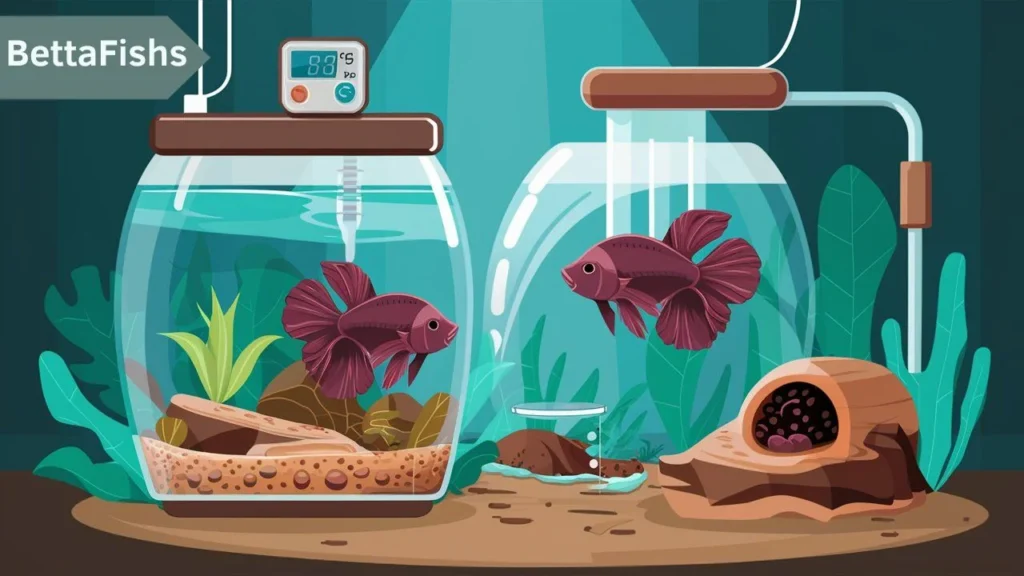
Common Mistakes in Temperature Regulation
Overheating or Underheating the Tank
One common mistake is setting the heater too high or too low. Overheating can cause your betta to become hyperactive and stressed, while underheating can make them sluggish and prone to illness.
Inconsistent Temperature Levels
Fluctuations in temperature are just as harmful as having the wrong temperature. Sudden changes can shock your betta, leading to stress and possible death. Make sure your heater maintains a consistent temperature day and night.
Signs Your Betta Fish Is Suffering from Temperature Issues
Behavioral Changes
If your betta is swimming erratically, hiding more often, or appearing unusually inactive, it could be a sign of temperature stress. Bettas are typically active and curious, so any change in behavior is a red flag.
Physical Symptoms
Look for signs like clamped fins, discoloration, or labored breathing. These symptoms can indicate that your betta is uncomfortable or stressed due to the water temperature being too high or too low.
Long-Term Effects of Incorrect Water Temperature
Impact on Betta’s Lifespan
Maintaining the right water temperature isn’t just about keeping your betta comfortable; it’s crucial for their longevity. Constant exposure to incorrect temperatures can shorten their lifespan significantly.
Potential Health Issues
Incorrect temperatures can lead to a host of health problems, including fin rot, swim bladder disease, and increased susceptibility to infections. Keeping the water at the optimal temperature is a key preventative measure.
Adjusting Water Temperature Safely
Steps to Gradually Change the Temperature
If you need to adjust the water temperature, do it gradually. Sudden changes can shock your betta. Aim to change the temperature by no more than 1-2 degrees Fahrenheit per hour.
Emergency Measures for Sudden Temperature Drops or Increases
In the event of a sudden temperature drop, such as during a power outage, consider wrapping the tank in a blanket to retain heat. If the water overheats, perform a partial water change with cooler water and increase ventilation.
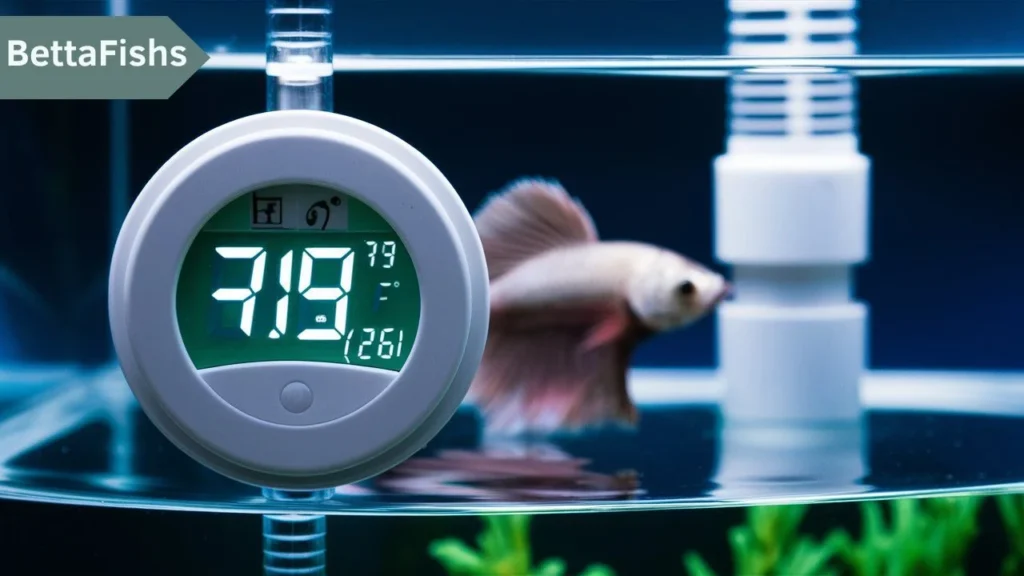
The Role of Tank Size and Environment
How Tank Size Affects Temperature Stability
Larger tanks are generally more stable when it comes to temperature because they hold more water, which is slower to change temperature. Smaller tanks are more susceptible to rapid fluctuations, so they may require more careful monitoring.
Importance of Tank Placement
Where you place your tank can affect its temperature. Avoid placing the tank near windows, vents, or direct sunlight, as these can cause unwanted temperature changes. Instead, choose a spot where the temperature remains consistent throughout the day.
Special Considerations for Betta Fish Breeding
Temperature Requirements for Spawning
If you’re breeding betta fish, temperature becomes even more critical. Betta eggs and fry require a slightly higher temperature of around 80°F to 82°F (26.5°C to 28°C) for optimal development.
Ensuring Optimal Conditions for Fry
Maintaining a stable temperature is vital for the survival of betta fry. Fluctuations can be fatal to young bettas, so consider using multiple thermometers and heaters to ensure consistency.
Seasonal Considerations
Handling Temperature Fluctuations During Winter and Summer
Winter and summer pose unique challenges for maintaining water temperature. In winter, ensure your heater is working efficiently, and in summer, avoid placing your tank in hot areas and consider using a fan to cool the water.
Using Insulation or Cooling Methods
Insulating your tank with a heater cover during winter can help maintain a stable temperature. In summer, consider using ice packs or a specialized aquarium cooler to prevent overheating.
The Importance of Water Quality Alongside Temperature
Balancing pH, Hardness, and Temperature
Temperature is just one part of maintaining a healthy environment for your betta. pH levels, water hardness, and cleanliness all play a role. Regularly test your water and make adjustments as needed to keep your betta happy and healthy.
The Role of Filtration
A good filtration system can help maintain water quality, which in turn helps keep the temperature stable. Regularly clean and maintain your filter to ensure it’s working effectively.
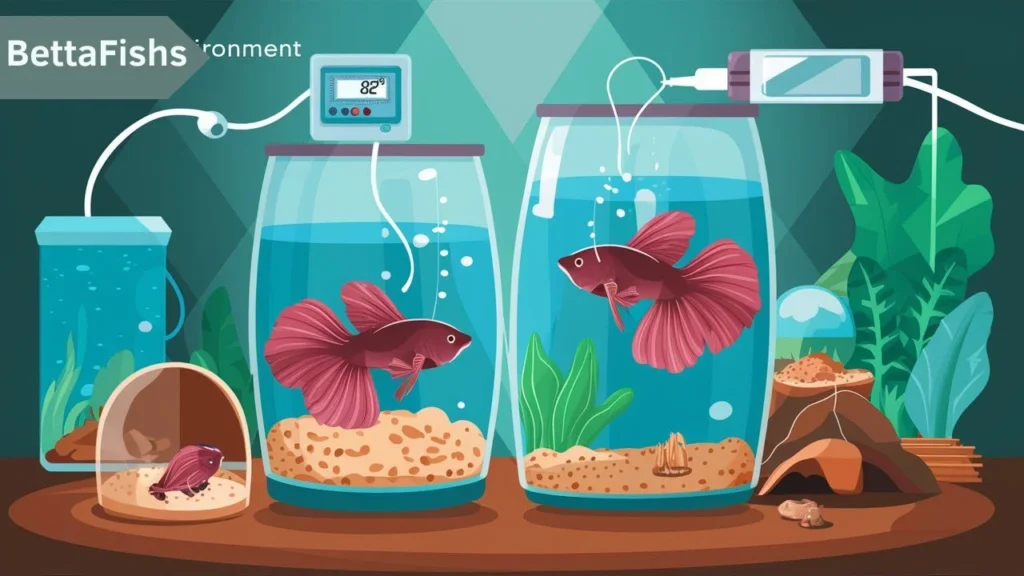
Tech Gadgets to Help Maintain Water Temperature
Smart Heaters and Thermostats
Smart heaters that can be controlled via apps or that have built-in thermostats are becoming increasingly popular. These devices can provide real-time monitoring and alerts, helping you keep your betta’s environment just right.
Temperature Alert Systems
Consider investing in a temperature alert system that notifies you if the water temperature goes outside the desired range. This can be especially useful during times when you’re away from home.
Conclusion
Maintaining the ideal water temperature for your betta fish is crucial to their health and longevity. By understanding their natural habitat, using the right equipment, and monitoring the temperature regularly, you can create a stable and comfortable environment for your betta to thrive.
Remember, consistency is key avoid sudden changes, and always keep an eye on the temperature, especially during seasonal shifts. With the right care, your betta fish will live a long, happy, and vibrant life.
FAQs
What Happens if the Water Temperature Is Too High?
If the water temperature is too high, your betta may become overly active, stressed, and prone to diseases like ich. Long-term exposure can shorten their lifespan.
Can Betta Fish Survive in Cold Water?
Betta fish can survive in slightly cooler water for short periods, but prolonged exposure to cold water will weaken their immune system and make them more susceptible to diseases.
How Quickly Should I Adjust the Temperature?
Adjust the temperature gradually, changing it by no more than 1-2°F per hour. Rapid changes can shock your betta and cause serious health issues.
Does Betta Fish Need Light to Maintain Temperature?
While betta fish do not require light to maintain temperature, lighting can help regulate the tank environment. However, avoid using light as the primary heat source.
Can I Use a Regular Thermometer for My Aquarium?
It’s best to use a thermometer specifically designed for aquariums. These are more accurate and designed to withstand the water environment.


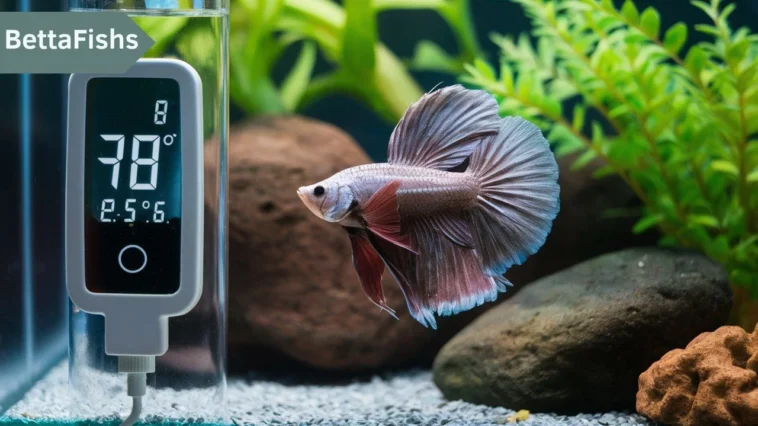

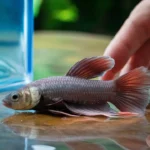
One Comment
Leave a ReplyOne Ping
Pingback:How to warm Betta fish water?